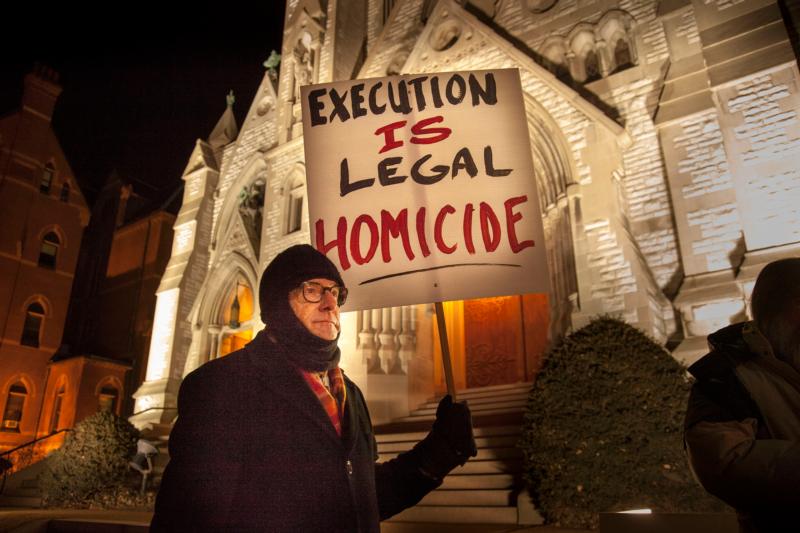By Christopher White, The Tablet’s National Correspondent

NEW YORK – In the wake of the Supreme Court and the state of Alabama denying a Muslim inmate’s request to have an imam present at his execution, Catholic leaders have decried the move as “disturbing” and an affront to religious liberty.
Domineque Ray, a death row inmate in Alabama, had requested to have his imam present at the time of his death on Feb. 7. However, the Alabama prison maintained that it was a security risk to allow an individual that was not an employee of the prison to be present.
The standard practice of the state is to allow a Christian chaplain inside the execution chamber at the time of the execution.
Last Wednesday, a Federal Appeals court granted a stay in the execution, but on Thursday by a vote of 5-4 the Supreme Court allowed it to go forward.
Ray had been sentenced to death in 1995 for the rape and murder of a 15-year-old girl, Tiffany Harville. Following the Supreme Court’s decision, Ray was executed on Thursday evening, while his imam, Yusef Maisonet, was required to watch from another room via a glass panel.
In response, the United States Conference of Catholic Bishops (USCCB) issued a statement expressing a two-fold disapproval of both the death penalty and the decision to deny Ray proper spiritual care.
“The execution of Domineque Ray deeply troubles us. The death penalty itself is an affront to human dignity, and the Church has long called for its abolition in the United States and around the world. Mr. Ray bore the further indignity of being refused spiritual care in his last moments of life, in violation of the First Amendment to the U.S. Constitution and Alabama law,” they wrote.
The statement was issued on Friday by Archbishop Joseph Kurtz of Louisville, chairman of the USCCB Committee for Religious Liberty, and Bishop Frank Dewane of Venice, Florida, chairman of the Committee on Domestic Justice and Human Development.
“This unjust treatment is disturbing to people of all faiths, whether Muslim, Christian, Jewish, or otherwise. People deserve to be accompanied in death by someone who shares their faith.”
“It is especially important that we respect this right for religious minorities,” the bishops said. “As Pope Francis said during his recent trip to the United Arab Emirates, ‘What we are called to do as believers is to commit ourselves to the equal dignity of all.’ Let us make this commitment today.”
Religious liberty was one of the primary themes during Francis’s February 3-5 trip to the United Arab Emirates.
The Court’s decision was also condemned by a range of Catholic legal scholars and activists, who took to social media to express their outrage.
Professor Robert George, a constitutional law scholar at Princeton University, wrote on Twitter: “What Alabama did in not allowing a condemned man to have a clergyman of his own faith with him when he was executed was wrong. It did not need to happen and should not have.”
Professor Francis Beckwith who teaches courses on religion and jurisprudence issued a similar statement on Twitter.
“This is a moral outrage. Shame on Alabama for egregiously violating this man’s religious conscience,” he wrote.
On Friday, the Catholic Mobilizing Network Against the Death Penalty said, “As people of faith, we are deeply saddened by the fact that Alabama would not allow Domineque, a devout Muslim, to have an imam present for his execution…To bar a condemned man’s spiritual adviser from his execution chamber is to strip his very last shred of human dignity away from him. Alabama did nothing to uphold a culture of life last night.”
Sister Helen Prejean, one of the nation’s most prominent anti-death penalty activists, called the execution “wrong in so many ways.”
Ray’s execution comes at a time when the use of the death penalty is on the decline in the United States.
In 2018, there were fewer than 30 executions and 50 death penalty sentences, marking a historic low.
In August 2018, Francis updated the Catechism of the Catholic Church and declared that the death penalty is “inadmissible.”
“The death penalty is inadmissible because it is an attack on the inviolability and dignity of the person,” reads the Catechism now, with the addition that the Church “works with determination for its abolition worldwide.”

When did the bishops approach the crime victim’s family in this case?